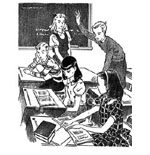
Praying for a Nun
GUEST COLUMN
Dame Consolation stands beside my desk. Her arms are crossed under her white scapular, and she has an understanding smile.
Although Boethius’s Dame is a personification of philosophy and its solaces, she is also a feminine form with human features, one I had met many years before I ever read The Consolation of Philosophy, which contains many of the old verities of the Church Fathers, found also in Plato, especially his Phaedo, an early source of the precepts of service to others, sacrifice, the suffering and purification of the soul, the soul’s immortality, the dignity of the human person, and the pursuit of the Good — the bedrock of Christian eschatology.
They were also evident in the daily life of Sr. Martin de Porres, O.P. (formerly Corinne Recker, 1928-1979).
Sister Martin, who taught everything a second-grader needed to know, or at least everything in the second-grade curriculum, had been standing behind me for several minutes with her arms folded under her scapular. Sister was young and tall and pleasant.
I was gazing out of a large classroom window at the leafy street below, daydreaming of the Flats.
You May Also Enjoy
The aim below, 'tis my wish and my hope:/ Comply with the decree of Master Pope,/ And squander not words, nor waste precious time,/ And blight not Doctrine put to verse and rhyme.
Where constant mobility is the norm, where is home? When mothers do not welcome their children home from school, where do children belong?
The beatification process of Pope Pius XII should present no insurmountable obstacle to friendly Catholic-Jewish relations or Vatican-Israel alliances. But some don't see it that way.

